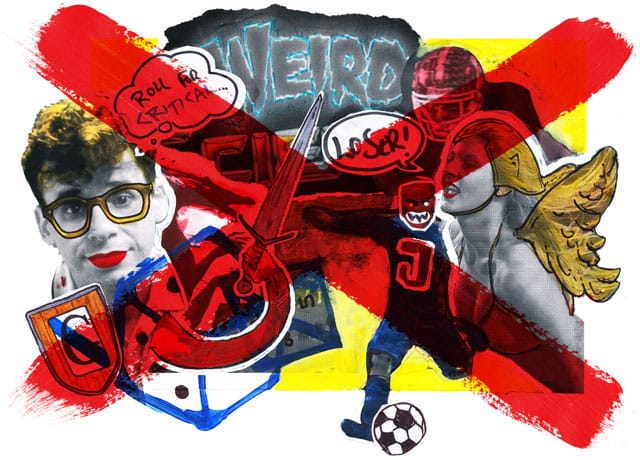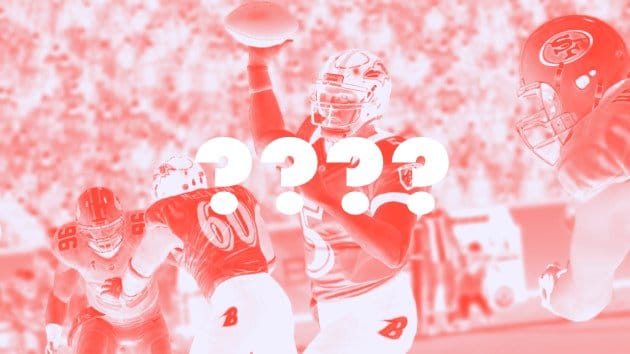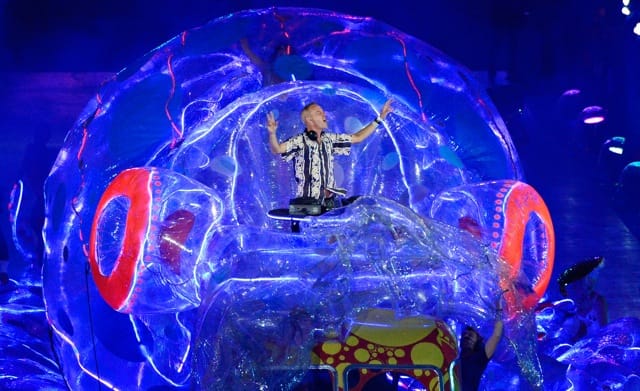Open Your Eyes

I’m becoming bitter. I’ve made myself into “that sports guy,” the asshole who tweets incessantly about sports videogames as if shouting at a mountain, begging it to move. I’ve become monomaniacal, Captain Ahab, and it’s my own damn fault. I played Dungeons & Dragons and I played lacrosse. I’ve shouldered some made-up burden of trying to justify the value of the sports genre to a game industry and community that doesn’t really care to hear about it. Worse, for some, I am a living reminder of their adolescent suffering.
To them, I am a jock. I am the bully they fled from, a reminder of the hurt and pain they were forced to endure as a teenager. I am not welcome in their world of videogames. The game industry remains a community divided—split along old, largely apocryphal lines of geek and jock. It seems old wounds heal slowly.
There is sound evidence for the systemic cultural exclusion of sports in the game industry. The annual Game Developers Conference, which took place last month, has minimal attendance from mainstream sports game developers, and offers few talks on sports videogame development and design. Despite tremendously impressive years for both the FIFA and NBA 2K series, not a single major sports game was nominated for a Game Developers Choice Award this year in any of the categories. Although MLB: The Show has, for the past few years, been one of the most visually stunning videogames I have ever played, it remains a supposedly niche title. Few major sports games made it onto any website or magazine’s top-10 list in 2011. Sports videogame journalists, like Owen Good at Kotaku, have to fight tooth and nail for sports games to receive equal coverage to other videogame genres. The videogame press offers token reviews of the bigger sports titles, but rarely affords this massively popular genre the same respect as other types of videogames.
The rhetoric in “gamer” communities about sports videogames is equally dismissive. Taken as yearly roster updates with little or no value compared to titles in other genres, sports games and their players are marginalized within gamer culture. Sports games are for “jocks” or for “frat guys,” not for “real” gamers 40 hours into their Skyrim campaign. But the very characterization of a “jock” or “frat guy” playing Madden is highly problematic. The world of sports fandom is enormous. Indeed, trying to simply characterize a sports gamer would be about as easy as trying to characterize a “gamer” in general.
This is, in fact, part of the problem. The social divide between geeks and jocks is the result of generations of bullying. Today the scars are increasingly exposed and bare, and the tragic marginalization endured by youths left out of the “mainstream” has begun to penetrate our collective consciousness. Bullying has made the morning news. There’s a new documentary on the topic. Sports are very much a part of the hegemonic “mainstream” culture, and too often, the bullies are athletes. The stereotype is exaggerated but not false—the jocks still abuse the geeks and gamers.
The social divide between geeks and jocks is the result of generations of bullying.
So-called gamers have emerged as a social subset of a displaced geek culture. Playing, knowing, talking about, and loving videogames, boardgames, and paper-and-pencil role-playing games all serve as cultural markers, identifying members of a new community safe from the scorn and ridicule of popular culture. But social identification depends on setting up boundaries of distinction, on establishing who is “in” and who is “out.” In fact, the culture of gamers has separated and fortified against that of sports.
And this is part of the point as well. Prejudice and hurtfulness are not exclusive to jocks. Look inside gamer communities, whether reading the typically depraved comments on any gaming website, or following the latest misogynist freakout in the fighting-games community, and you’ll see that gamers are just as good at being exclusive, and hateful, and nasty as jocks.
Truth be told, it’s in the domain of independent games, smart blogs, and academic discourse that sports and sports videogames are given a fair shake. Many indie developers—like Ramiro Corbetta, the maker of Hokra; and Douglas Wilson from Die Gute Fabrik, and the maker of Johann Sebastian Joust—are not only inspired by sports when they design, but are fans of sports as well. Michael Abbott, the self-proclaimed Brainy Gamer, has blogged for a long time about baseball from the perspective of a gamer and a fan of the sport, including a post about how baseball relates to other types of games. E-sports is exploding in popularity, blurring the lines between game and sport. And a handful of noted academics in game studies have recognized that the vast culture of sports gaming is worth studying.
They should all be credited with broadening our understanding of who a “gamer” is. The irony, of course, is that everyone plays games, and the safe gamer world is crumbling faster than an Angry Birds tower. In an age of collapsing structures of identity, online personae, Facebook, digital worlds, Twitter, and digital media explode and unravel the very concept of a centralized self. As Jason Johnson noticed, our notions of the “gamer” are not very accurate. Sports happen to be one of the very popular ways that people engage games.
The safe gamer world is crumbling faster than an Angry Birds tower.
It behooves the game industry to reconsider its grudges—to better understand that great games are all around us, and need not fall into safe or familiar categories. They need to open their eyes, and their minds, and shake off their prejudice. Sports videogame developers are creating brilliant innovations that transcend the specificity of the real-world sport—whether in role-playing elements, narrative components, or even interface design. The emergent narrative and persistence of an NBA 2K12 campaign, complete with dialogue-based press conferences, player personalities and interaction, and tremendous televisual world building, is an impressive feat of design.
Sports are by no means perfect, and they suffer profoundly in areas such as gender equality, competition, and finance. But the world of sports is a rich, multinational, multicultural domain with so much to offer a community that loves games, if it would only look.
You would have to hide in a fallout shelter to avoid hearing about New York Knicks sensation Jeremy Lin. And yet it seems that this is what many in the game industry do. Many of my colleagues and acquaintances in games still resent and distrust the community of athletes that hurt them in their youth. They don’t care about sports or sports videogames because that world, that community, is not theirs. They appreciate the security of the industry and the like-minded fan community that they have built. Such are the machinations of cultural identification.
So here is my sincere request. For the benefit of a growing, expanding, and explosive game community; for the sake of improving the quality of all videogames; and for the sake of a collective inclusivity that wholeheartedly rejects the malice and anger that led to our predicament—open your eyes.
Boomshakalaka! explores the intersection of sports culture and videogame culture.
Illustration by Daniel Purvis.



